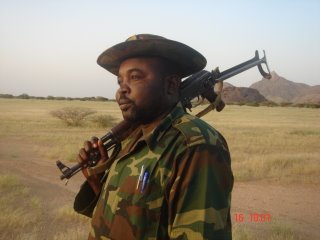Darfur conflict dominates Africa summit
ADDIS ABABA, Ethiopia — Bloodshed in Sudan's Darfur region dominated the African Union summit Monday, undermining Sudan's bid to lead the bloc as the U.N. chief said scorched-earth military policies are "a terrifying feature of life" in the vast, arid area.
With Sudanese President Omar al-Bashir looking on, U.N. Secretary-General Ban Ki-moon said that "the toll of the crisis remains unacceptable," with more than 200,000 people killed and 2.5 million displaced in four years of fighting.
He called on African leaders to end the deadlock created by Sudan's refusal to allow U.N. peacekeepers into Darfur.
Hours later, in a rebuff to al-Bashir, the African Union chose Ghana to head the 53-member bloc, turning aside Sudan's bid for the post for the second year in a row.
"By consensus vote, President (John) Kufuor of Ghana has been elected to the presidency of the African Union," Alpha Oumar Konare, the AU's chief executive, told reporters at the session in Ethiopia's capital, Addis Ababa.
Konare said Sudan supported the decision, but Sudanese leaders had been adamant that their country deserved the rotating chairmanship.
"This is a very unfortunate development," Sudanese Foreign Ministry spokesman Ali Sadiq said in Khartoum, Sudan. "The African heads of states had committed to this last year. That they changed their mind shows there was heavy pressure from outside Africa."
Sudan had pushed to get the post at last year's summit, which it hosted, but African leaders selected Republic of Congo's president in a compromise deal in which he would hold it for a year and then hand it over to al-Bashir.
But that deal hinged on Sudan demonstrating progress in bringing peace to Darfur. Instead of calming, Darfur's violence in recent months has spilled into neighboring Chad and Central African Republic.
International organizations opposed Sudan leading the AU, accusing al-Bashir's government of encouraging conflict in Darfur. Rebel leaders in the region said they would stop considering an AU peacekeeping mission as an honest broker if Sudan was selected.
Nobel laureate Desmond Tutu also sharply criticized Sudan on Monday, and a French aid group said it was pulling out of western Sudan because of insecurity. Six other international charities said Sunday that their work in Darfur will soon be paralyzed unless urgent action is taken.
Darfur has been spiraling out of control since rebels from ethnic African farm communities took up arms against the Arab-dominated central government in 2003.
Sudan's government has been accused of retaliating against civilians as well as supporting paramilitary groups from nomadic Arab tribes blamed for some of the worst atrocities in the conflict. Sudan's government denies the allegations.
The government signed a peace agreement with one Darfur rebel faction last May, but violence has only worsened. Sudan and Chad also have been trading accusations of supporting each others' rebel groups.
Al-Bashir has opposed a U.N. Security Council resolution that calls for 22,000 U.N. peacekeepers to replace or absorb the weak AU force of 7,000 soldiers now in Darfur.
But late Monday, Sadiq, the Foreign Ministry spokesman in Khartoum, said Sudan's government had agreed to cooperate on forming a "hybrid force" for Darfur that would include U.N. troops.
"What has come to be known as the hybrid force has been agreed on by all parties, including Sudan," Sadiq told The Associated Press.
He said no final agreement on troop numbers had been reached, although AU and U.N. officials say the United Nations could be sending as many as 10,000 to 15,000. Sadiq said U.N. troops could begin deploying in July.
Sudan has reneged on previous agreements to allow the United Nations into Darfur, however, and al-Bashir — who has the final say on such matters — was not immediately available for comment.
Ban released a statement Monday saying Sudan's president had agreed to "accelerate" efforts to create such a force.
The summit, which ends Tuesday, is also focusing on assembling an African peacekeeping force for Somalia, which has been without an effective central government since clan warlords toppled a longtime military dictatorship in 1991 and then fell to fighting among themselves.
A U.N.-backed interim administration supported by Ethiopia's military defeated an Islamic militia in the Horn of Africa nation, but Ethiopian troops are pulling out and there are worries that warlords and other armed groups could disrupt efforts to restore stability.
